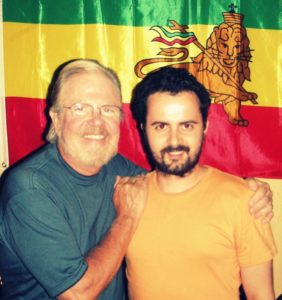Remembering Tom Regan (1938 – 2017) by Richard Twine
In 2007 whilst a research associate at Lancaster University I was fortunate to be selected as a Visiting Research Fellow at North Carolina State University (NCSU) in Raleigh, USA. This was part of the inaugural Animals and Society Institute (ASI) fellowship scheme and I was one of 7 fellows to pass through the first intake of the annual scheme. It involved a 6-week residency in Raleigh in the sweltering heat of June and July. It was an unforgettable opportunity to meet peers from the field of animal studies. Those alongside me included the sociologist Liz Cherry (Manhattanville), the historian Zeb Tortorici (NYU) and philosopher Tom Tyler (Leeds). Furthermore, we were privileged to benefit from the close connection between the Animals and Society Institute and the philosopher Tom Regan who had lived in Raleigh for some time.
Tom was involved from the beginning, attending our meetings, our presentations and having one to one meetings with all the fellows. It was incredible to have the world’s most famous animal rights philosopher as part of the fellowship. The NCSU library was home to an archive of Tom’s books, articles and other materials gathered throughout his career, and was made available to all the fellows. As part of one of the meetings we had a reading group focused on a key chapter from Tom’s The Case for Animal Rights, published 24 years previously, in 1983. He was very interested in all our projects, which were either future articles, PhD projects or in my case a chapter in a book on Animal Biotechnology I was writing at the time. The fellowship also benefitted from weekly visitors from the field, including Mylan Engel, Piers Beirne, Clifton Flynn, Cary Wolfe, Kathie Jenni and Julie Urbanik.
Tom Regan’s presence and contribution added considerable gravitas to the fellowship, a scheme launched by Ken Shapiro of the ASI. Situated in context Regan’s work represented the first concerted attempt to construct a philosophy of animal rights by anyone! To be clear, he was the first human being to methodically consider a case for animal rights. Although there had been previous moments of Western philosophical deliberation on the question of the animal, the emergence in the 1970s and 1980s of animal ethics can be seen in retrospect as associated with a new reflexivity toward the human treatment of other animals, and inspired the growth of the animal rights movement generally. Tom Regan’s The Case for Animal Rights and his subsequent body of work have become go to classics in the field of animal studies.
However, Animal Ethics continues to receive insufficient attention from academic philosophy departments and our cultures at large, despite the question of the animal being fundamental to anthropocentric concerns of human health, environmental quality and climate change.
During the fellowship we were all invited to a social gathering at Tom’s house amongst the beautifully wooded suburbs of Raleigh and he’d often join us in the evenings for dinner. Memorable times included at a pizzeria serving vegan pizza (a novel experience for a British vegan in 2007) and a meal at a local Ethiopian restaurant (see photo below) to mark the end of the fellowship. In meeting him personally he conveyed depth, kindness, humility and openness.
A couple of years ago we’d heard that Tom had been unwell and Zeb, Tom (Tyler) and myself organised a delivery of artisan vegan cheese to be sent over to him, he thanked us personally. It was with great sadness that we heard about Tom’s passing in February 2017. Understandably it evoked those great memories of the summer of 2007, when we got to spend time in the company of Tom, who I described on twitter, following the news, as a revolutionary philosopher, a humble and kind man.
Richard Twine, Co-Director Centre for Human-Animal Studies (CfHAS)

